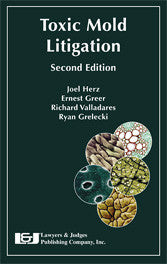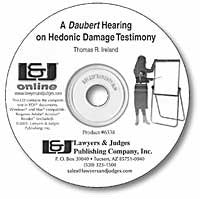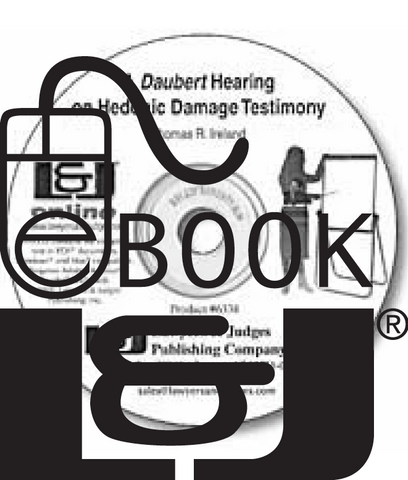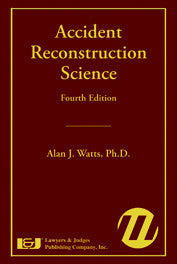
Toxic Mold Litigation Second Edition
- Authors: Joel L. Herz, Ernest L. Greer, Richard Valladares, Ryan Grelecki
- ISBN 10: 1-933264-37-3
- ISBN 13: 978-1-933264-37-0
- Copyright Date Ed: October 1, 2009
- Pages: 403 pages
- Binding Information: Paperback
- Size: 6 ✕ 9 Inches (US)
This expanded second edition now includes several new state-specific chapters, with over twice the content!
Mold law and litigation is a complex area and often requires numerous professional disciplines to address it. Detailed information is often difficult to find. This book provides you with that information. It offers critical background information for context, covering such topics as exposure, illness, allergic reactions, types of claims filed, and insurance issues. It offers a detailed look at the most important elements of mold law in critical states (now expanded to include 15 major states) where mold litigation has been prevalent. It also offers strategic advice to assist parties with mold litigation.
The book begins by introducing basic information about mold and mold law, which is designed to familiarize you with the issue and place it in context. The following chapters discuss evidence and evidentiary standards in mold litigation, sampling and analysis for mold contamination, and current science relating to mold, all topics of importance when working on mold cases. The remainder of the book is devoted to detailed chapters on mold law and litigation, in Arizona, California, Delaware, Florida, Georgia, Illinois, Indiana, Massachusetts, New Jersey, New York, Oregon, Pennsylvania, South Carolina, Texas, and Washington, states where there is a high incidence of mold litigation. These chapters provide you with valuable models if you are currently writing mold legislation for other states, or are involved with mold cases around the country. This book also includes a list of Internet resources, which assist in mold litigation and investigation.
This book is an indispensable guide for anyone interested or currently participating in mold litigation.
This book is also available as an E-book. Click here to purchase and download:
Topics include:
- Legal aspects of mold litigation
- Evidentiary standards in toxic mold litigation
- The Frye "General Acceptance" test
- The Daubert test
- Evidentiary standards for mold-related injuries and diseases
- Injuries and diseases resulting from exposure to mold
- Sampling and analysis for mold contamination
- Air and surface sampling
- The current science of mold
- Possible explanations for mold problems
- Negligence claims
- Breach of contract claims
- Express or implied warranty claims
- Personal injury and illness claims
- Property damage claims
- Misrepresentation in sale of property claims
- Tort claims
- Spoliation of evidence
- Insurance issues including mold-specific exclusion provisions
- Toxic mold litigation in Arizona
- Toxic mold litigation in California
- Toxic mold litigation in Delaware
- Toxic mold litigation in Florida
- Toxic mold litigation in Georgia
- Toxic mold litigation in Illinois
- Toxic mold litigation in Indiana
- Toxic mold litigation in Massachusetts
- Toxic mold litigation in New Jersey
- Toxic mold litigation in New York
- Toxic mold litigation in Oregon
- Toxic mold litigation in Pennsylvania
- Toxic mold litigation in South Carolina
- Toxic mold litigation in Texas
- Toxic mold litigation in Washington
- An overview of mold litigation in other states
- Internet resources for mold litigation
- And more!
Table of Contents
Chapter 1. Mold
Barry L. Bellovin, Esq.
1.1 Legal Aspects of Mold Litigation Overview
1.2 Legal Theories
1.3 Insurance Issues
1.4 Statute of Limitations
Chapter 2. Evidentiary Standards in Toxic Mold Litigation
Dennis I. Wilenchik, Esq. and Adam S. Polson, Esq.
2.1 Introduction
2.2 Expert Witness Evidentiary Standards
A. The Frye "General Acceptance" Test
B. The Daubert Test
C. States Applying a Hybrid System or Their Own Evidentiary Standards
D. Rule 703 of the Federal Rules of Evidence
2.3 Evidentiary Standards for Mold-Related Injuries and Diseases
A. Manual of Scientific Evidence
B. Allergic Reactions Resulting From Exposure to Mold
C. Infection Resulting From Exposure to Mold
D. Injury and Disease Resulting from Exposure to Toxic Mold
2.4 Causation
A. General Causation
B. Specific Causation
2.5 Preparing Data for Trial
2.6 Conclusion
Chapter 3. Sampling and Analysis for Mold Contamination in the Indoor Environment
Linda D. Stetzenbach, Mark P. Buttner, and Sean P. Abbott
3.1 Introduction
3.2 Planning for the Monitoring of an Indoor Environment
3.3 Methods for Sampling and Analysis
A. Analysis
B. Air Sampling
C. Source/Surface Sampling
D. Interpretation of Data
Chapter 4. The Current Science of Mold
Ryan C. Kuhn, Ph.D. and Mindy Olivares, M.S.
4.1 Introduction to Mold
4.2 Conducting a Mold Investigation
4.3 Air Sampling
4.4 Surface Sampling
4.5 Data Interpretation Consideration
A. Laboratory Selection
B. Measuring Units
C. Background Debris
D. Standardized Interpretation of Data
E. Determining Human Exposure to Mold
4.6 Current Guidance Documents
Chapter 5. An Overview of Toxic Mold Litigation in Arizona
Dennis I. Wilenchik, Esq.
5.1 Introduction
5.2 Possible Explanations for Arizona’s Mold Problems
A. The Pace of Construction in Arizona
B. Building Materials Used in Arizona
C. Arizona’s Warm Temperatures
D. Homeowners’ Contribution to the Mold Problem
5.3 Typical Claims Asserted by Plaintiffs in Arizona
A. Introduction
B. Negligence
C. Implied Warranty of Habitability
D. Breach of Contract or Breach of Express Warranty
E. Landlord/Tenant Issues
F. Other Potential Causes of Action and Homeowner Complaints
G. Damages
5.4 Recent Construction Legislation in Arizona
A. HB 2620 (2002), SB 1311 (2004), and SB 1374 (2006): Purchaser Dwelling Action; Opportunity to Repair
B. A.R.S. § 12-2602
5.5 Reported Mold Case Law in Arizona
5.6 Admissibility of Expert Witness Testimony in Arizona
5.7 Conclusion
Chapter 6. An Overview of Toxic Mold Litigation in California
Eric S. Fisher, Esq. and Ryan C. Grelecki, Esq.
6.1 Introduction
6.2 California Mold Legislation
6.3 Potential Causes Of Action
A. Negligence
B. Breach of Fiduciary Duty
C. Strict Liability
D. Breach of Warranty
E. Constructive Eviction
F. Violation of Business and Professions Code Section 17200
6.4 Damages
A. Personal Injury Claims
B. Property Damage Claims
6.5 Statutes Of Limitations
6.6 Admissibility Of Scientific Evidence Or Expert Testimony
6.7 Insurance Coverage Issues
Chapter 7. An Overview of Toxic Mold Litigation in Delaware
Douglas F. Schleicher, Esq. and Julie Beddingfield, Esq.
7.1 Introduction
7.2 State and Local Enforcement Authority
A. Delaware State Housing Authority
B. Local Cities and Municipalities
7.3 Private Rights of Action
A. Contractual Claims for Economic Loss
B. Torts
Chapter 8. An Overview of Toxic Mold Litigation in Florida
David B. Weinstein, Esq. and Kimberly S. Mello, Esq.
8.1 Introduction
8.2 Personal Injury Claims
8.3 Workers’ Compensation Claims
8.4 Class Actions
8.5 Property Damage and Building Defect Claims
8.6 Florida’s Construction Defect Law
A. Application
B. Procedure
8.7 Insurance Coverage
8.8 Florida Mold Legislation
A. Application
B. Licensing, Fees, and Additional Requirements
C. Prohibitions and Penalties
8.9 Conclusion
Chapter 9. An Overview of Toxic Mold Litigation in Georgia
Ernest L. Greer, Richard J. Valladares, and Ryan C. Grelecki
9.1 Introduction
9.2 Potential Causes of Action
A. Tort Claims
B. Breach of Contract
C. Breach of Implied Warranties
9.3 Class Actions
9.4 Potential Defenses
A. Statute of Limitations
B. Statute of Repose
C. Spoliation
D. Right to Repair
9.5 Damages and the Economic Loss Doctrine
9.6 Admissibility of Scientific Evidence or Expert Testimony
9.7 Georgia Mold Legislation
9.8 Insurance Coverage
A. First-Party Property Coverage
B. Third-Party Liability Coverage
C. Absolute Pollution Exclusion
D. Bad Faith Claims
Chapter 10. An Overview of Toxic Mold Litigation in Illinois
Edward Eshoo, Jr., Esq.
10.1 Introduction
10.2 First-Party Property Insurance Coverage
10.3 Residential Real Property Disclosure Act
10.4 Personal Injury and Property Damage Claims
A. Standard for Admissibility of Experts
B. Statutes of Limitations and Repose
10.5 Third-Party Liability Insurance
10.6 Mold Legislation
Chapter 11. An Overview of Toxic Mold Litigation in Indiana
Abigail A. Clapp, Esq. and Matthew Levinstein
11.1 Introduction
11.2 Potential Causes of Action
A. Negligence
B. Breach of Contract
C. Breach of Implied Warranties
D. Fraud
E. Workers’ Compensation
11.3 Class Actions
11.4 Potential Defenses
A. Statute of Repose
B. Spoliation of Evidence
C. Contractual Provisions
11.5 Damages
A. Attorneys’ Fees and Costs
B. Cost of Repair versus Diminution of Value
C. Opportunity to Repair
D. Application of the Economic Loss Doctrine
11.6 Admissibility of Expert Testimony
11.7 Indiana Mold Legislation
11.8 Insurance Coverage
A. Absolute Pollution Exclusion Provisions
B. Mold-Specific Exclusion Provisions
11.9 Conclusion
Chapter 12. An Overview of Toxic Mold Litigation in Massachusetts
David M. Governo, Esq., Marianne E. Brown, Esq., and Sarah E. O’Leary, Esq.
12.1 Introduction
12.2 Massachusetts Common Law Theories
A. Negligence
B. Breach of Contract
C. Breach of Express Warranty
D. Breach of Implied Warranty
E. Nuisance and Negligent Maintenance
12.3 Massachusetts Statutory Claims
A. Landlord-Tenant Laws
B. Massachusetts Consumer Protection Law
12.4 Procedural Considerations
A. Statutes of Limitation
B. Claims Against The Government
C. Statute of Repose
12.5 Insurance Considerations
A. Policy Coverage
B. Claims Litigation
Chapter 13. An Overview of Toxic Mold Litigation in New Jersey
Patrick J. Perrone, Esq., Richard J. Valladares, Esq. and Ashley Turner
13.1 Introduction
13.2 Potential Causes of Action
A. Negligence
B. Breach of Contract
C. Breach of Implied Warranties
D. Fraud or Negligent Misrepresentation Claims
E. Workers’ Compensation
13.3 Class Actions
13.4 Potential Defenses
A. Statute of Repose
B. Spoliation
C. Contractual Provisions
13.5 Damages
A. Attorneys’ Fees and Costs
B. Cost of Repair versus Diminution of Value
C. Opportunity to Repair
D. Economic Loss Doctrine
13.6 Admissibility of Scientific Evidence or Expert Testimony
13.7 New Jersey Mold Legislation
13.8 Insurance Coverage
A. Absolute Pollution Exclusion
B. Mold-Specific Exclusions
13.9 Conclusion
Chapter 14. An Overview of Toxic Mold Litigation in New York
Richard J. Valladares, Esq. and Ryan C. Grelecki, Esq.
14.1 Introduction
14.2 Tort Actions
A. Negligence
B. Misrepresentation
C. New York Consumer Protection Statute
D. Medical Monitoring Claims
14.2 Contract Actions
14.3 Potential Defenses to Mold Claims
A. Defenses to Personal Injury Claims
B. Defenses to Property Damage Claims
14.4 Insurance
14.5 Conclusion
Chapter 15. An Overview of Toxic Mold Litigation in Oregon
Kelly Vance, Esq.
15.1 Introduction
15.2 Insurance Issues Affecting Oregon Mold Claims
15.3 Standard of Proof for Experts in Oregon
15.4 Negligence, Breach of Contract and the Economic Loss Rule
15.5 Oregon Toxic Mold Decisions
A. Strader v. Grange Mutual Insurance Company
B. O’Hara v. David Blain Construction, Inc.
C. Haynes v. Adair Homes, Inc.
Chapter 16. An Overview of Toxic Mold Litigation in Pennsylvania
Douglas F. Schleicher, Esq. and Julie Beddingfield, Esq.
16.1 Introduction
16.2 State and Local Enforcement Authority
A. Pennsylvania Department of Environmental Protection
B. Local Regulations
16.3 Potential Private Rights of Action
A. Contract Claims
B. Pennsylvania Unfair Trade Practices and Consumer Protection Law
C. Residential Real Estate Disclosure Law
D. Tort Actions
16.4 Insurance Coverage
Chapter 17. An Overview of Toxic Mold Litigation in South Carolina
Eric Fosmire, Esq.
17.1 Introduction
17.2 Right to Cure Residential Construction Defects
17.3 Statutes of Limitations and Repose
17.4 Insurance Issues
A. Trigger of Coverage
B. Duty to Defend
17.5 Joint and Several Liability
17.6 Theories of Liability in Mold Actions -
17.7 Class Actions
17.8 Experts
17.9 South Carolina Toxic Mold Case Law
Chapter 18. An Overview of Toxic Mold Litigation in Texas
Stephen Pate, Esq. and Rhonda M. Sigman, Esq.
18.1 Introduction
18.2 Mold Litigation in Texas
A. The Statute of Limitation and Accrual of Action Issues
B. Difficulties in Maintaining Personal Injury Claims
C. Insurance Litigation
D. Texas Mold Legislation
Chapter 19. An Overview of Toxic Mold Litigation in Washington
Kelly Vance, Esq.
19.1 Introduction
19.2 Construction Negligence Claims in Washington
19.3 Washington Standards for Admissibility of Expert Evidence
19.4 Reported Mold Cases
19.5 Insurance Issues
Chapter 20. Overview of Toxic Mold Case Law in Other States
Richard J. Valladares, Esq., Ander Krupa, Esq., and Ryan C. Grelecki, Esq.
Internet Resources




